Looking to save big on your intimate wedding? Consider affordable officiant options that won't break the bank. You can ask a close friend or family member to get ordained online, opt for a civil ceremony at the courthouse, or reach out to local community leaders. Retired clergy members, college professors, or even your wedding planner might be willing to officiate at a lower cost. For a unique touch, cultural or spiritual guides can add depth to your ceremony. Don't forget the possibility of sharing an officiant with another couple to split the expense. These budget-friendly choices can make your special day both meaningful and cost-effective.
Key Takeaways
- Friend or family member officiants offer a personal touch and significant cost savings for small weddings.
- Online ordination services provide quick, inexpensive options for customized ceremonies with legal recognition.
- Civil ceremonies at courthouses are cost-effective, simple, and legally binding for couples seeking minimal fuss.
- Local community leaders, such as mayors or school principals, may officiate weddings at little to no cost.
- Retired clergy members offer experience and flexibility at lower rates compared to active clergy for intimate celebrations.
Friend or Family Officiant
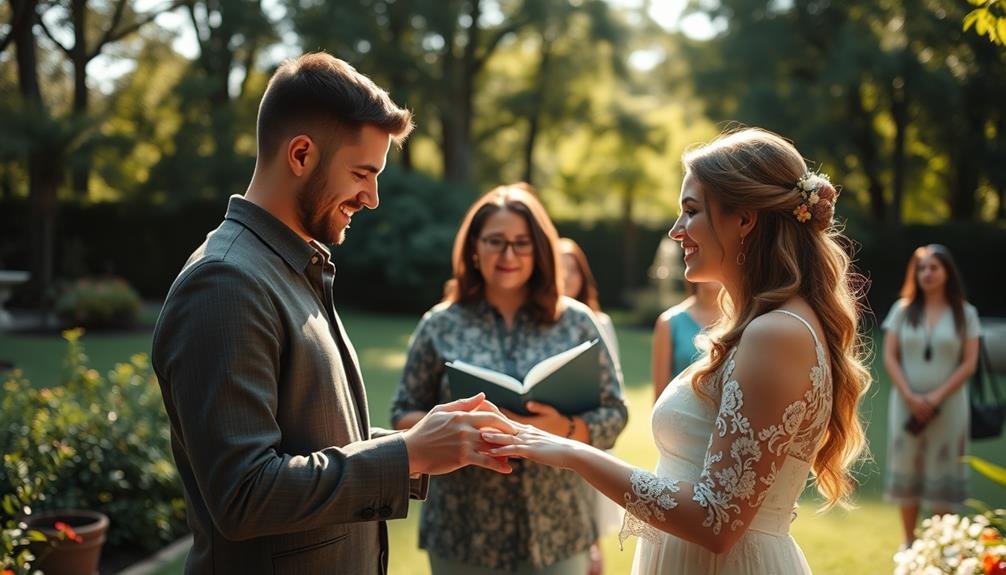
Choosing a friend or family member to officiate your wedding can be a heartwarming and budget-friendly option. It adds a personal touch to your ceremony and can save you hundreds of dollars. Before you ask someone, make certain they're comfortable with public speaking and can handle the responsibility.
Check your state's laws regarding who can legally perform marriages. Some states require officiants to be ordained, which can often be done online quickly and inexpensively. Others may need to register with the county clerk's office. Ascertain your chosen officiant meets all legal requirements well in advance of your wedding date.
Work closely with your officiant to create a ceremony that reflects your relationship and values. Provide them with resources and examples of wedding scripts to help them prepare. Consider holding a rehearsal to ascertain everything runs smoothly on the big day.
Remember to show your appreciation for their efforts. While you may not be paying them, a thoughtful gift or contribution to their ordainment costs can be a nice gesture.
With proper planning, having a friend or family member officiate can make your intimate wedding even more special and memorable.
Online Ordination Services
In light of the growing trend towards personalized weddings, online ordination services have become increasingly popular. These platforms allow you to become legally ordained quickly and inexpensively, enabling you to officiate weddings for friends and family or even start a side business.
To become ordained online, you'll typically need to provide basic personal information and pay a small fee. Most services offer instant ordination, while others may require a short waiting period. Once ordained, you can perform wedding ceremonies in many states, though it's essential to check local laws regarding officiant requirements.
Here's a comparison of popular online ordination services:
| Service | Ordination Fee | Processing Time | Credentials Provided |
|---|---|---|---|
| Universal Life Church | Free | Instant | Digital Certificate |
| American Marriage Ministries | Free | Instant | Digital Certificate |
| Open Ministry | $19.99 | 24-48 hours | Physical Certificate |
| Rose Ministries | $29.99 | Instant | Digital + Physical |
| Esoteric Interfaith Church | $39.99 | 1-3 days | Extensive Package |
When choosing an online ordination service, consider factors such as reputation, recognition in your state, and additional resources provided. Some services offer wedding ceremony scripts, legal guidelines, and ongoing support for officiants.
Civil Ceremony at Courthouse
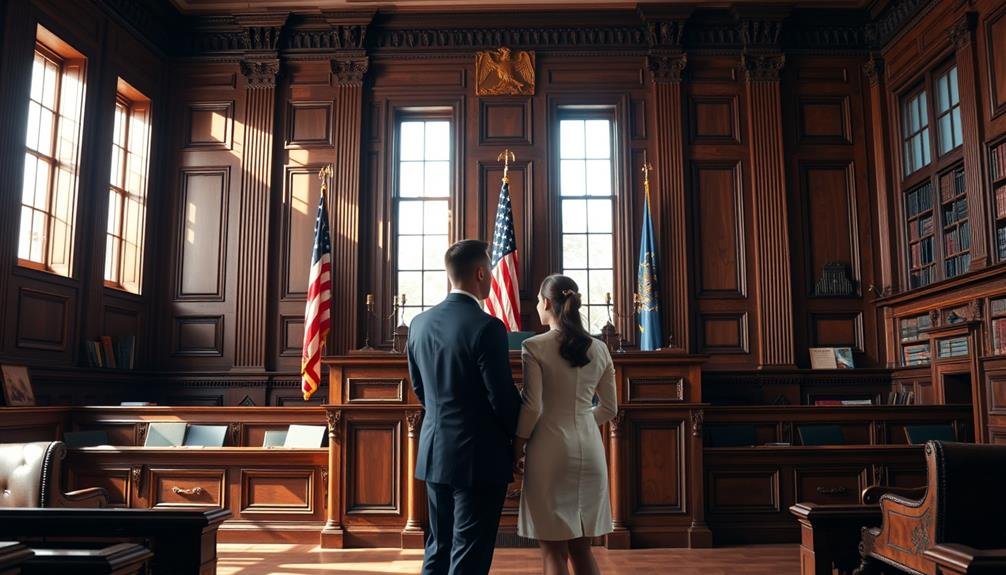
If you're looking for a cost-effective way to legally tie the knot, consider a civil ceremony at your local courthouse.
You'll find this option offers a quick and simple process, often requiring just an appointment, identification, and a marriage license.
Courthouse weddings typically involve minimal fees, making them an ideal choice for couples seeking a no-frills, budget-friendly marriage ceremony.
Cost-Effective Legal Marriage
A civil ceremony at the courthouse offers a straightforward and budget-friendly option for couples seeking a legal marriage. You'll typically pay a small fee for the marriage license and an additional cost for the ceremony itself, which can range from $25 to $100 depending on your location.
To arrange a courthouse wedding, contact your local clerk's office to schedule an appointment. You'll need to bring valid identification and any required documents. Most courthouses perform ceremonies during regular business hours, making it convenient for couples with busy schedules.
The ceremony is usually brief, lasting about 10 to 15 minutes. A judge or court clerk will officiate, guiding you through the legal requirements and vows. While the setting may be less romantic than traditional venues, you can still personalize the experience by exchanging rings or reciting your own vows.
After the ceremony, you'll receive your marriage certificate, making your union officially recognized. This option is ideal for couples who prioritize legality and simplicity over elaborate celebrations.
It's also perfect if you're planning a larger celebration later but want to be legally married sooner.
Quick and Simple Process
Civil ceremonies at courthouses offer more than just cost-effectiveness; they're also known for their quick and simple process. You'll find that getting married at a courthouse is straightforward and efficient.
First, contact your local courthouse to inquire about their marriage services and schedule an appointment. Many courthouses offer same-day ceremonies, so you can often get married on short notice.
Before your appointment, verify you have all necessary documents, typically including valid IDs, birth certificates, and a marriage license.
On the day of your ceremony, arrive at the courthouse with your partner and witnesses (if required). You'll meet with a court official, usually a judge or magistrate, who'll perform a brief ceremony lasting about 10-15 minutes.
The official will guide you through the process, including exchanging vows and rings if desired. After the ceremony, you'll sign the marriage certificate, and the courthouse will file it for you.
In most cases, you'll receive a certified copy of your marriage certificate on the same day or within a few days, making your union official and legally recognized.
Local Community Leaders
Community spirit often extends to wedding celebrations, making local leaders excellent options for affordable officiants. You'll find that many community figures are willing to officiate weddings as a service to their neighbors. Consider reaching out to your town's mayor, council members, or other elected officials. They're often authorized to perform marriages and may do so for free or at a minimal cost.
Don't overlook other community pillars like school principals, librarians, or nonprofit directors. These individuals frequently have the authority to officiate and may be happy to participate in your special day.
You might also explore local service organizations like Rotary or Lions Clubs, whose members could be qualified officiants.
When approaching potential officiants, be clear about your expectations and the ceremony's details. Offer to meet with them to discuss your vision and ascertain they're comfortable with the role.
Remember, while they may not charge a fee, it's courteous to offer a small gift or donation to their organization as a token of appreciation.
Retired Clergy Members
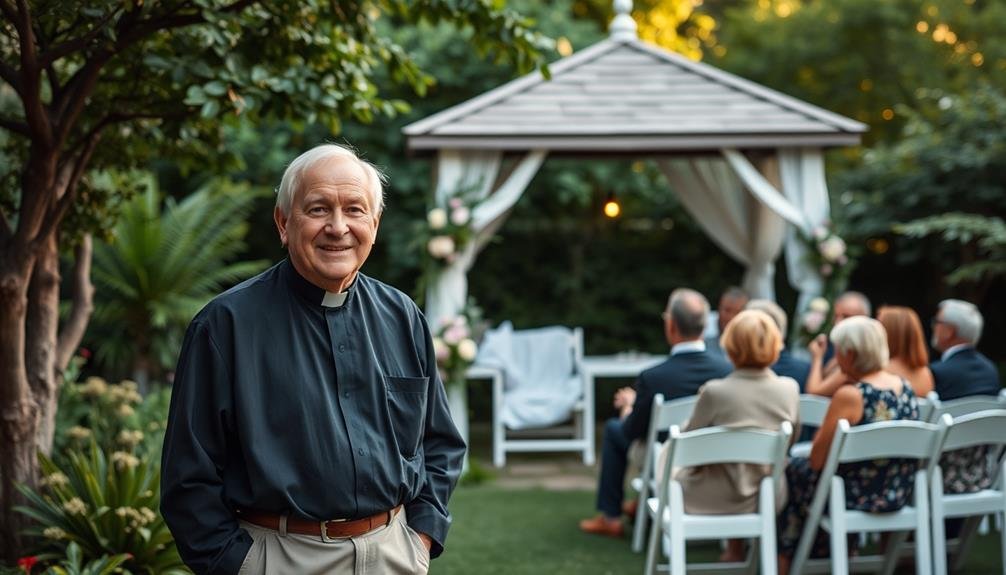
Retired clergy members can be excellent officiants for your small wedding, offering a wealth of experience and compassion.
You'll find they often have more flexible schedules than active clergy, allowing for greater ceremony planning freedom.
These retired celebrants may also provide cost savings compared to their currently practicing counterparts, making them an attractive option for budget-conscious couples.
Experienced and Compassionate Celebrants
Seasoned and compassionate, retired clergy members offer an excellent option for couples seeking an affordable officiant for their small wedding.
These experienced individuals bring years of wisdom and spiritual guidance to your ceremony, often at a fraction of the cost of active clergy.
You'll find retired clergy from various faiths and denominations, allowing you to choose someone who aligns with your beliefs.
They're typically more flexible with their time and may be willing to travel to your chosen venue.
Many retirees maintain their ordination status, ensuring your marriage is legally recognized.
Don't hesitate to reach out to local religious organizations or retirement communities to connect with retired clergy.
You can also search online platforms that list officiants, filtering for retired clergy members.
When you meet potential candidates, discuss their experience, approach to ceremonies, and any specific elements you'd like included.
Flexible Scheduling Options
Flexibility is a key advantage when working with retired clergy members as officiants for your small wedding. These experienced individuals often have more open schedules compared to active clergy, allowing you to choose from a wider range of dates and times for your ceremony.
You'll find that retired clergy are often willing to accommodate last-minute changes or unique timing requests. They can officiate at non-traditional hours, such as sunrise ceremonies or late-night elopements, without conflicting with regular church duties.
This flexibility extends to location as well, with many retired clergy happy to travel to your chosen venue, whether it's a backyard, beach, or mountain top.
Additionally, retired clergy may be more open to personalizing your ceremony. They can work with you to craft a service that reflects your beliefs and values, blending traditional elements with modern touches.
You'll have the opportunity to meet with them multiple times to discuss your vision and make adjustments as needed. This level of customization and availability is particularly valuable for couples planning intimate weddings with specific desires for their ceremony.
Potential Cost Savings
You'll often find that retired clergy members offer more budget-friendly options for officiating small weddings. These experienced individuals have often performed numerous ceremonies throughout their careers and are now more flexible with their rates.
They may not have the overhead costs associated with active clergy, allowing them to charge less for their services.
Retired clergy members might be willing to officiate for a donation rather than a set fee, which can greatly reduce your costs. They may also be more open to negotiation, especially for simple, intimate ceremonies.
Don't hesitate to discuss your budget constraints with them; many are understanding and may offer discounted rates for smaller weddings.
Additionally, retired clergy often have a wealth of experience in crafting personalized ceremonies. They can help you create a meaningful, tailored service without the high price tag of some professional wedding officiants.
Celebrants-in-Training
Aspiring celebrants offer a unique opportunity for couples planning small weddings on a budget. These celebrants-in-training are often keen to gain experience and build their portfolios, making them more affordable than established officiants.
You'll find them through celebrant training programs, wedding schools, or local officiating organizations.
When considering a celebrant-in-training, you should ask about their background, training, and any supervised ceremonies they've performed. Many are passionate about creating personalized ceremonies and may dedicate extra time to crafting your perfect wedding script.
They're often more flexible with their availability and willing to accommodate your specific needs.
However, it's essential to verify they're legally authorized to perform marriages in your area. Some training programs provide temporary licenses, while others require trainees to work under the supervision of a licensed officiant.
You'll want to discuss these details upfront and verify their credentials.
While working with a celebrant-in-training may require more patience and guidance on your part, it can result in significant savings and a fresh, enthusiastic approach to your ceremony.
Just remember to have clear communication and set realistic expectations to guarantee a smooth experience.
Humanist Officiants
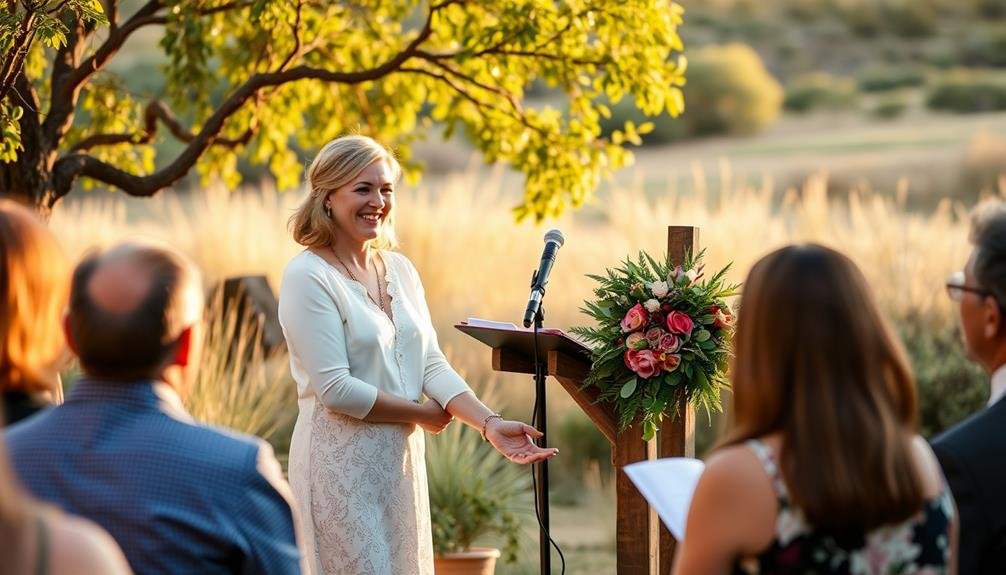
Embracing a secular approach to marriage, humanist officiants offer an inclusive and personalized ceremony option for couples seeking a non-religious wedding.
These celebrants focus on human values, relationships, and personal beliefs rather than religious traditions.
You'll find that humanist officiants often charge less than traditional clergy, making them an affordable choice for small weddings.
They're trained to create customized ceremonies that reflect your unique love story and shared values.
You can expect a humanist officiant to work closely with you to craft vows, select readings, and incorporate meaningful rituals that resonate with your worldview.
Many humanist organizations provide directories of certified officiants, making it easy to find one in your area.
When selecting a humanist celebrant, look for someone who's licensed to perform marriages in your state and has experience with small, intimate ceremonies.
Interfaith Ministers
While humanist officiants cater to secular couples, interfaith ministers offer a bridge between different religious traditions. If you and your partner come from diverse faith backgrounds, an interfaith minister can create a ceremony that honors both of your beliefs.
These officiants are trained to blend various religious elements, guaranteeing that your wedding reflects your unique spiritual journey.
You'll find that interfaith ministers are often more affordable than traditional clergy, making them an excellent choice for small weddings on a budget.
They're typically open to customizing your ceremony, allowing you to incorporate specific rituals or readings that are meaningful to you and your families. This flexibility can help ease tensions that might arise from differing religious expectations.
When choosing an interfaith minister, look for someone who's experienced in working with your particular faith combination.
Ask about their training and approach to blending religious traditions. Don't hesitate to discuss your vision for the ceremony and confirm they're comfortable with your ideas.
Many interfaith ministers also offer premarital counseling, which can be valuable as you navigate your religious differences and plan your future together.
Justice of the Peace
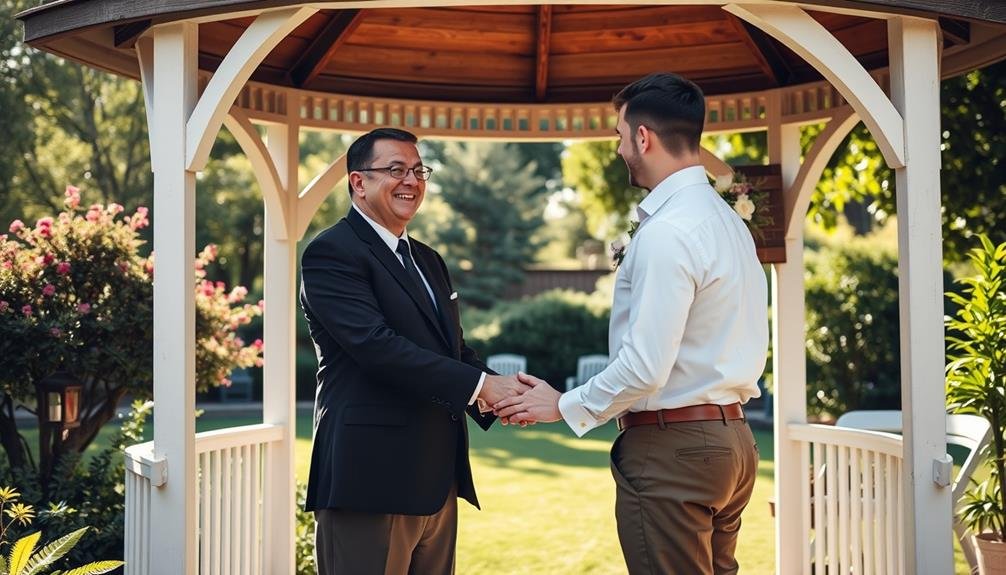
For couples seeking a straightforward, no-frills ceremony, a Justice of the Peace offers an affordable and efficient option. These civil officials are authorized to perform marriage ceremonies and can provide a quick, legal union without religious elements.
You'll find that a Justice of the Peace typically charges less than religious officiants or professional wedding celebrants. Fees vary by location but often range from $50 to $100 for a basic ceremony. Some may charge extra for travel or additional services.
To book a Justice of the Peace, contact your local city hall or county clerk's office. They'll provide a list of available officials in your area. It's best to book early, especially during peak wedding seasons.
Keep in mind that ceremonies performed by a Justice of the Peace are usually brief and to the point. If you want a more personalized touch, you can often work with them to include short readings or personal vows. However, their primary role is to guarantee the legal aspects of your marriage are properly handled.
A Justice of the Peace is ideal if you're planning a courthouse wedding or a simple ceremony at a location of your choice.
Notary Public Officiants
Notary public officiants offer another budget-friendly option for couples planning small weddings. These professionals are typically less expensive than traditional wedding officiants and can legally perform marriage ceremonies in many states.
To find a notary public who can officiate your wedding, start by checking your state's laws regarding their authority to solemnize marriages. If it's allowed, you'll find that notaries are often more readily available and flexible than other officiants.
They're familiar with legal documents and can help guarantee your marriage license is completed correctly. Many notaries work in banks, law offices, or government buildings, making them easy to locate.
When choosing a notary public officiant, consider their experience with weddings. While they're qualified to perform the ceremony, some may have more practice than others.
Ask about their style and if they're willing to personalize the ceremony to your preferences. Don't forget to discuss fees upfront, as rates can vary.
College Professors or Educators
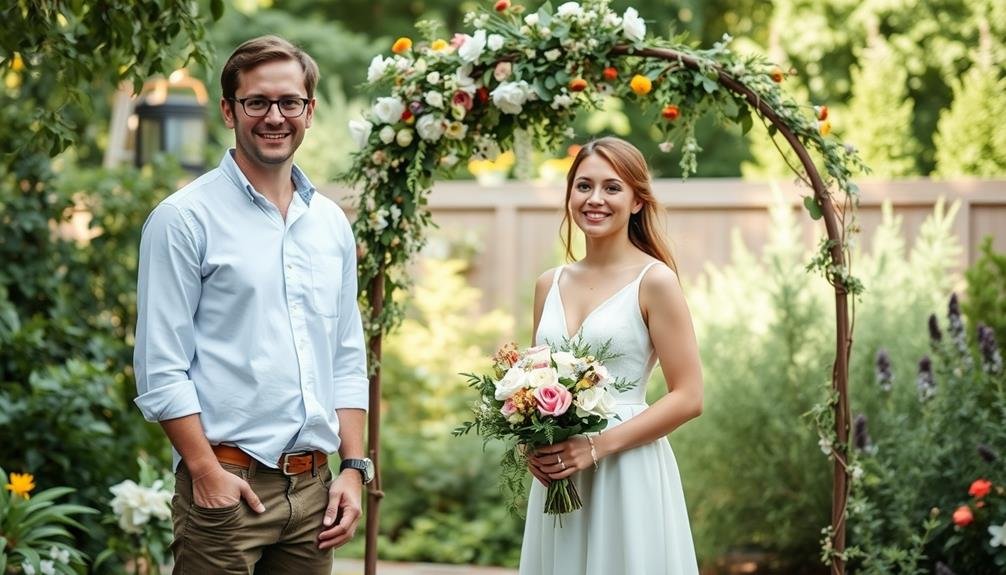
College professors and educators can make excellent wedding officiants for your small ceremony.
Their expertise in public speaking guarantees a smooth and engaging delivery of your vows and ceremony proceedings.
Additionally, their diverse subject knowledge can add depth and personalization to your wedding, potentially incorporating relevant historical, cultural, or literary elements that resonate with you as a couple.
Expertise in Public Speaking
Educators and college professors often possess exceptional public speaking skills, making them excellent candidates for officiating small weddings. Their experience in addressing audiences of various sizes translates well to the intimate setting of a small ceremony.
You'll benefit from their ability to articulate clearly, project their voice, and maintain a comfortable pace throughout the proceedings.
These professionals are typically well-versed in crafting compelling narratives and engaging presentations, which can enhance the emotional impact of your ceremony. They're adept at adapting their tone and delivery to suit different occasions, ensuring your wedding feels both personal and dignified.
Their expertise in research can also be valuable if you want to incorporate specific cultural or historical elements into your vows.
Many educators have experience managing unexpected situations, a skill that can prove invaluable if any last-minute changes or surprises occur during your ceremony.
Additionally, their background in education often means they're patient and willing to work with you to create a personalized script that reflects your unique love story.
Diverse Subject Knowledge
Beyond their public speaking prowess, professors and educators bring a wealth of diverse subject knowledge to the table when officiating small weddings. Their extensive academic backgrounds allow them to weave fascinating anecdotes, historical references, and cultural insights into your ceremony, making it both meaningful and educational.
You'll benefit from their ability to tailor the content to your interests and backgrounds. For example, if you're history buffs, a history professor might draw parallels between your love story and famous historical couples. Literature professors can incorporate beautiful quotes from classic works, while philosophy educators can explore the deeper meanings of love and commitment.
Their interdisciplinary approach can also add depth to your ceremony. A sociology professor might discuss the cultural significance of marriage across different societies, while a psychology educator could touch on the science of love and long-lasting relationships. This diverse knowledge base guarantees your ceremony is unique, engaging, and intellectually stimulating.
Moreover, their academic connections may provide access to beautiful campus venues at discounted rates, potentially saving you money on your wedding location as well.
Wedding Planner as Officiant
Have you considered asking your wedding planner to officiate your ceremony? This option can be both cost-effective and convenient, especially for small, intimate weddings. Your wedding planner already knows your vision and style, making them uniquely qualified to conduct a personalized ceremony that aligns with your preferences.
To make this arrangement work smoothly, follow these steps:
- Confirm your planner's willingness and availability to officiate.
- Verify they're legally authorized to perform marriages in your location.
- Discuss any additional fees for this service.
- Collaborate on the ceremony script and structure.
By choosing your wedding planner as your officiant, you'll benefit from their expertise in event flow and timing. They'll seamlessly shift from coordinating pre-ceremony details to officiating and then managing post-ceremony logistics.
This approach can save you money on hiring a separate officiant while maintaining a cohesive feel throughout your celebration.
Remember to check local laws regarding officiants, as requirements vary by state and country. If your planner isn't already certified, they may need to complete a simple online ordination process to legally officiate your wedding.
Cultural or Spiritual Guides
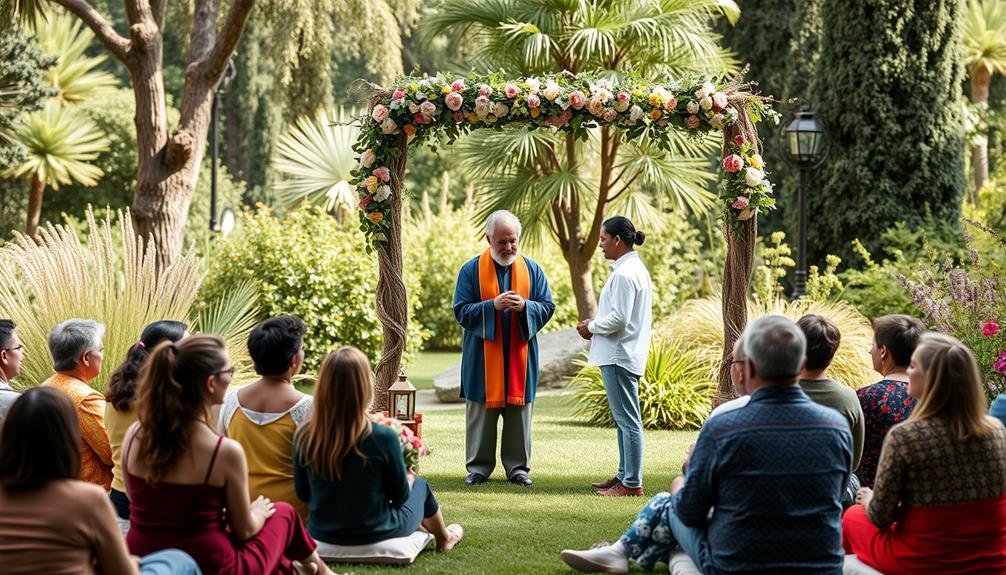
Many couples seeking a meaningful yet affordable officiant option turn to cultural or spiritual guides. These individuals often have deep connections to specific traditions or belief systems, making them ideal for couples who want to incorporate their heritage or spiritual practices into their ceremony.
You'll find that cultural guides, such as tribal elders or community leaders, can bring authenticity and wisdom to your wedding. They're often willing to officiate for a nominal fee or even as a gift to the couple.
Similarly, spiritual guides like meditation teachers, yoga instructors, or life coaches can offer a unique perspective and personalized touch to your ceremony.
When considering this option, reach out to respected figures in your community or spiritual circles. You may be surprised by who's willing to help.
Remember to check local laws regarding officiant requirements, as some jurisdictions have specific rules about who can legally perform weddings.
Officiant-Sharing With Another Couple
If you're considering sharing an officiant with another couple, you'll need to coordinate schedules and locations carefully.
You can greatly reduce costs by splitting the officiant's fees between two couples.
While sharing an officiant, it's still possible to personalize each ceremony to reflect your unique relationship and preferences.
Coordinating Schedules and Locations
When sharing an officiant with another couple, nailing down the logistics can be tricky. You'll need to coordinate schedules and locations carefully to guarantee both ceremonies run smoothly. Start by discussing potential dates with the other couple and your officiant, aiming for a day that works for all parties involved. Consider factors like travel time between venues and the officiant's availability.
Once you've settled on a date, focus on timing and location details. Here are four key steps to streamline the process:
- Determine ceremony order: Decide which couple will have their ceremony first.
- Set realistic time buffers: Allow ample time between ceremonies for travel and setup.
- Choose venues strategically: Select locations that are relatively close to minimize travel time.
- Create a detailed timeline: Outline specific times for each ceremony, including arrival, setup, and departure.
Remember to communicate openly with the other couple and your officiant throughout the planning process.
Be flexible and willing to compromise on certain aspects to make the shared arrangement work. With careful coordination and clear communication, you can successfully share an officiant and save money on your intimate celebration.
Splitting Costs and Fees
Sharing an officiant with another couple can lead to significant savings, but you'll need to agree on how to split the costs. The most common approach is to divide the officiant's fee equally between both couples. This method is straightforward and fair, especially if you're having similar ceremony lengths and locations.
However, there might be situations where an uneven split makes more sense. For example, if one couple requires the officiant to travel further or perform a longer ceremony, they might agree to pay a larger portion of the fee.
You'll also need to take into account additional expenses like travel costs, rehearsal fees, or any custom services requested by either couple.
When negotiating the split, be transparent about your budget and expectations. Discuss any potential extra costs upfront to avoid misunderstandings later.
It's essential to get the agreed-upon split in writing, either through a contract with the officiant or a separate agreement between the couples. This document should outline each couple's financial responsibilities and any conditions for sharing the officiant's services.
Personalizing Shared Ceremonies
While sharing an officiant can save money, you might worry about losing the personal touch in your ceremony.
However, with some creativity and collaboration, you can still make your shared ceremony unique and meaningful. Work closely with the officiant and the other couple to personalize the experience for both pairs.
Consider these ways to make your shared ceremony special:
- Customize vows: Write your own vows or choose unique readings that reflect your relationship.
- Incorporate personal rituals: Add symbolic gestures like handfasting or sand ceremonies that are specific to your union.
- Use distinct music: Select different processional and recessional songs for each couple.
- Create separate decorations: Design individual altar spaces or use different floral arrangements to distinguish each ceremony.
Frequently Asked Questions
How Far in Advance Should We Book an Officiant?
You'll want to book your officiant as early as possible, ideally 6-9 months before your wedding date. However, if you're planning a smaller or less traditional ceremony, you might have more flexibility with timing.
Can We Write Our Own Vows for a Non-Traditional Ceremony?
You can write your own vows for a non-traditional ceremony. It's a beautiful way to personalize your wedding and express your unique love story. Just be sure to discuss this with your officiant beforehand for their approval.
What's the Average Cost for a Professional Wedding Officiant?
You'll find professional wedding officiants typically charge between $200 to $800. Costs vary based on experience, location, and ceremony complexity. Remember, you're not just paying for the ceremony but their expertise and personalized service.
Are There Any Legal Requirements for Choosing an Officiant?
You'll need to check your state's laws for officiant requirements. They often include age restrictions, residency rules, and necessary credentials. Some states allow online ordinations, while others require government-appointed officiants. Always verify your chosen officiant's legal authority to perform marriages.
Can We Have a Bilingual Ceremony With an Officiant?
Yes, you can have a bilingual ceremony with an officiant. You'll need to find an officiant who's fluent in both languages or hire an interpreter. Discuss your preferences with the officiant to guarantee they can accommodate your bilingual needs.
In Summary
You've got plenty of affordable officiant options for your small wedding. Whether you choose a friend, use online ordination, opt for a courthouse ceremony, or explore other creative solutions, you'll save money without sacrificing the significance of your special day. Remember, it's not about how much you spend, but the love you're celebrating. With these budget-friendly choices, you'll start your marriage on solid financial footing while still having a meaningful, intimate ceremony.

I’m Sarah, the creator and writer behind this site. I’m a wife and a mother of two wonderful kids who keep me on my toes and inspire me daily. My passion lies in creating and organizing memorable events and group activities, where people can come together and make lasting memories.

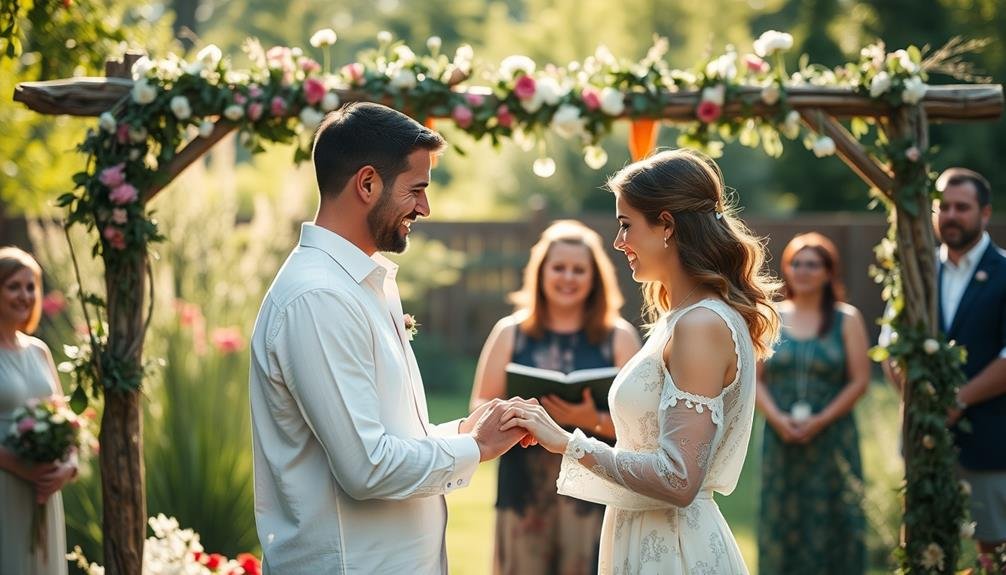



Leave a Reply